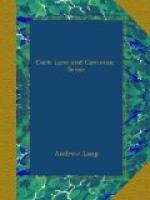{4} Not the house agent.
{9} Porphyry, Epistola xxi. Iamblichus, De Myst., iii. 2.
{11} The Port Glasgow story is in Report of the Dialectical Society, p. 200. The flooring was torn up; walls, ceilings, cellars, were examined by the police, and attempts were made to imitate the noises, without success. In this case, as at Rerrick in the end of the seventeenth century, and elsewhere, ’the appearance of a hand moving up and down’ was seen by the family, ’but we could not catch it: it quietly vanished, and we only felt cold air’. The house was occupied by a gardener, Hugh McCardle. Names of witnesses, a sergeant of police, and others, are appended.
{12} Report of Dialectical Society, p. 86.
{17a} For ourselves, we have never seen or heard a table give any responses whatever, any more than we have seen the ghosts, heard the raps, or viewed the flights of men in the air which we chronicle in a later portion of this work.
{17b} Report on Spiritualism, Longmans, London, 1871.
{18} Report, p. 229.
{21} Mr. Wallace may be credited with scoring a point in argument. Dr. Edmunds had maintained that no amount of evidence would make him believe in certain obvious absurdities, say the lions in Trafalgar Square drinking out of the fountains. Mr. Wallace replied: ’The asserted fact is either possible or not possible. If possible, such evidence as we have been considering would prove it; if not possible, such evidence could not exist.’ No such evidence exists for the lions; for the phenomena of so-called spiritualism, we have consentient testimony in every land, period and stage of culture. That certainly makes a difference, whatever the weight and value of the difference may be.
{26a} This illustration is not Mr. Lecky’s.
{26b} We have here thrown together a crowd of odd experiences. The savages’ examples are dealt with in the next essay; the Catholic marvels in the essay on ‘Comparative Psychical Research’. For Pascal, consult L’Amulette de Pascal, by M. Lelut; for Iamblichus, see essay on ‘Ancient Spiritualism’. As to Welsh, the evidence for the light in which he shone is printed in Dr. Hill Burton’s Scot Abroad (i. 289), from a Wodrow MS. in Glasgow University. Mr. Welsh was minister of Ayr. He was meditating in his garden late at night. One of his friends ’chanced to open a window towards the place where he walked, and saw clearly a strange light surround him, and heard him speak strange words about his spiritual joy’. Hill Burton thinks that this verges on the Popish superstition. The truth is that eminent ministers shared the privileges of Mediums and of some saints. Examples of miraculous cures by ministers, of clairvoyance on their part, of spirit-raps attendant on them, and of prophecy, are current on Presbyterian hagiology. No ministers, to our knowledge, were ‘levitated,’ but some nearly flew out of their pulpits. Patrick Walker, in his Biographia Presbyteriana, vol. ii. p. 21, mentions a supernatural light which floated round The Sweet Singers, Meikle John Gibb and his friends, before they burned a bible. Mr. Gibb afterwards excelled as a pow-wow, or Medicine Man, among the Red Indians.




